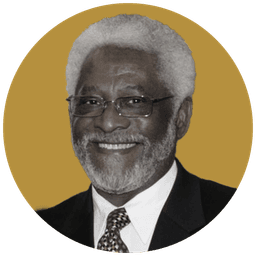Haiti Cries Out: Where Is President Biden, as My Countrymen Swelter Under a Bridge in Texas?
This article is from the archive of The New York Sun before the launch of its new website in 2022. The Sun has neither altered nor updated such articles but will seek to correct any errors, mis-categorizations or other problems introduced during transfer.

Haiti is again in the news, negatively of course — the country makes it into the news cycle only when there’s a catastrophe. This time Haiti’s problem has reached the United States with thousands of Haitian refugees packed under a bridge in Del Rio, Texas, after a long trek from countries as far as away as Brazil, Chile, even Argentina.
Certainly, they are not the victims of the earthquake of August 14 that devastated Haiti’s Greater South, killing more than 2,000 and making more than 50,000 homeless. The economic damage is yet to be determined. Nor are they running from the hurricane that, two days after the earthquake, drenched the homeless. Nor is their flight related to the assassination of the de facto president, Jovenel Moïse, in the bedroom of his private residence in an upscale neighborhood, in the wee hours of July 7.
These are refugees of the January 12, 2010 earthquake that reportedly caused more than 200,000 deaths in Haiti’s capital of Port-au-Prince and surroundings, making more than one million homeless, with economic damages into the billions. Though that earthquake had hit a fifth of the landmass, it had caused damages of more than 80% to the economy, the authorities had said.
The whole world rallied to Haiti’s support, and in a United Nations conference on March 31, 2010, pledges of $5.3 billion for that year and 2011 were made, with America pledging $1.5 billion. Eventually, it was reported that almost $10 billion had been raised from 130 countries with the hope of contributing toward a better future for Haiti.
Whatever happened to that money that was meant to “build Haiti back better,” according to the slogan of the “Interim Haiti Reconstruction Commission,” which was headed by former President Bill Clinton and Haiti’s prime minister at the time, Jean-Max Bellerive? There has not been any accounting.
There are still people living in tents — 11 years later. No wonder young persons in their 20s and 30s, facing a bleak future in Haiti, decided to leave in search of a better life. Brazil, which needed workers for a growing economy, was first to open its doors to Haitian refugees of the 2010 earthquake. Then, to a lesser extent, Chile and Argentina.
Haitians were settling in their new environments until COVID-19 disrupted the economies of the South American countries. They began their trek to the ultimate El Dorado, the United States. With the help of sharpies who prey on those seeking a new paradise, thousands undertook the trip north, especially since they thought that the Biden administration would be more lenient than the previous administration.
Now it is being reported that the United States will begin flying the Haitian refugees back home, returning them to the place from which they fled but which has become far worse than before. This will create a crisis of of unimaginable proportions in a country already reeling from its disasters.
I blame the international community and the Haitian leadership for this state of affairs. Since February 29, 2004, when President Jean-Bertrand Aristide was overthrown for, among other things, initiating the establishment of gangs, called chimères, to hold to power, the United Nations Stabilization Mission in Haiti has been in Haiti for 13 years.
Two lesser missions took the relay, including, currently, the United Nations Integrated Bureau in Haiti, known as BINUH. Under their watch, the Haitian authorities carried out the $4.2 billion heist of the PetroCaribe Fund and the gangs were reestablished by the president who styles himself a “Legal Bandit,” Michel Martelly.
Mr. Martelly was helped by his prime minister, Laurent Lamothe, who initially armed the gangs that have become a cancer on the country. The assassinated president, Javenal Moise, gave the “Federated Gangs” official recognition. Meanwhile, Haiti’s former presidents and prime ministers, living in the Dominican Republic, like Jean-Max Bellerive, or in Florida, like Michel Martelly and Laurent Lamothe, hope to return to power.
Such are the causes for Haitian refugees under a bridge in Del Rio, Texas. They are putting the Biden administration in the delicate position of being heartless toward refugees while thousands of Afghans are being welcomed. It’s a default on moral debts to Haiti going back to the days of Thomas Jefferson.
_________
Ambassador Joseph, former envoy of Haiti in Washington, is a contributing editor of The New York Sun.

